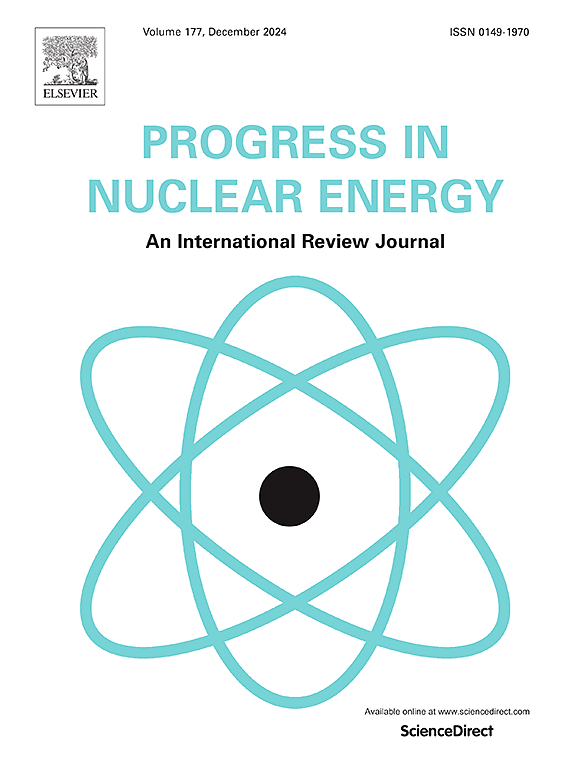Application of the Krylov-Schur method in three-dimensional nuclear reactor discrete ordinates criticality calculations
IF 3.3
3区 工程技术
Q1 NUCLEAR SCIENCE & TECHNOLOGY
引用次数: 0
Abstract
The accurate and efficient solution of the neutron transport equation is essential in nuclear reactor physics for understanding reactor kinetics, stability, and safety. This study investigates the application of the Krylov-Schur method to three-dimensional neutron transport criticality calculations within the Marvin code, comparing its performance to the traditional Power Iteration (PI) method. Using the Takeda benchmark problems, the Krylov-Schur solver demonstrated high accuracy in eigenvalue calculations and neutron flux distributions, closely matching reference Monte Carlo (MC) results. Additionally, the parallel efficiency of the Krylov-Schur method was evaluated, showing significant speed-up and better scalability compared to the PI method, particularly in large-scale computations. However, the method requires a larger memory footprint due to the need to store multiple Krylov subspace vectors and Schur decompositions. Despite this, the findings highlight the Krylov-Schur method's robustness and computational efficiency, making it a promising tool for neutron transport simulations in complex reactor configurations. Future work will focus on investigating the subtraction of high-order eigenvalues and eigenvectors using the Krylov-Schur method to further enhance neutron transport simulations.
克雷洛夫-舒尔法在三维核反应堆离散序数临界计算中的应用
在核反应堆物理学中,准确高效地求解中子输运方程对于理解反应堆动力学、稳定性和安全性至关重要。本研究调查了克雷洛夫-舒尔方法在 Marvin 代码三维中子输运临界计算中的应用,并将其性能与传统的功率迭代(PI)方法进行了比较。利用武田基准问题,克雷洛夫-舒尔求解器在特征值计算和中子通量分布方面表现出很高的精度,与参考蒙特卡罗(MC)结果非常接近。此外,还对 Krylov-Schur 方法的并行效率进行了评估,结果表明与 PI 方法相比,Krylov-Schur 方法的速度显著提高,可扩展性更好,尤其是在大规模计算中。不过,由于需要存储多个克雷洛夫子空间向量和舒尔分解,该方法需要占用较大的内存。尽管如此,研究结果还是凸显了克雷洛夫-舒尔方法的稳健性和计算效率,使其成为复杂反应堆配置中子输运模拟的理想工具。未来的工作将侧重于研究使用 Krylov-Schur 方法减去高阶特征值和特征向量,以进一步增强中子输运模拟。
本文章由计算机程序翻译,如有差异,请以英文原文为准。
求助全文
约1分钟内获得全文
求助全文
来源期刊

Progress in Nuclear Energy
工程技术-核科学技术
CiteScore
5.30
自引率
14.80%
发文量
331
审稿时长
3.5 months
期刊介绍:
Progress in Nuclear Energy is an international review journal covering all aspects of nuclear science and engineering. In keeping with the maturity of nuclear power, articles on safety, siting and environmental problems are encouraged, as are those associated with economics and fuel management. However, basic physics and engineering will remain an important aspect of the editorial policy. Articles published are either of a review nature or present new material in more depth. They are aimed at researchers and technically-oriented managers working in the nuclear energy field.
Please note the following:
1) PNE seeks high quality research papers which are medium to long in length. Short research papers should be submitted to the journal Annals in Nuclear Energy.
2) PNE reserves the right to reject papers which are based solely on routine application of computer codes used to produce reactor designs or explain existing reactor phenomena. Such papers, although worthy, are best left as laboratory reports whereas Progress in Nuclear Energy seeks papers of originality, which are archival in nature, in the fields of mathematical and experimental nuclear technology, including fission, fusion (blanket physics, radiation damage), safety, materials aspects, economics, etc.
3) Review papers, which may occasionally be invited, are particularly sought by the journal in these fields.
 求助内容:
求助内容: 应助结果提醒方式:
应助结果提醒方式:


